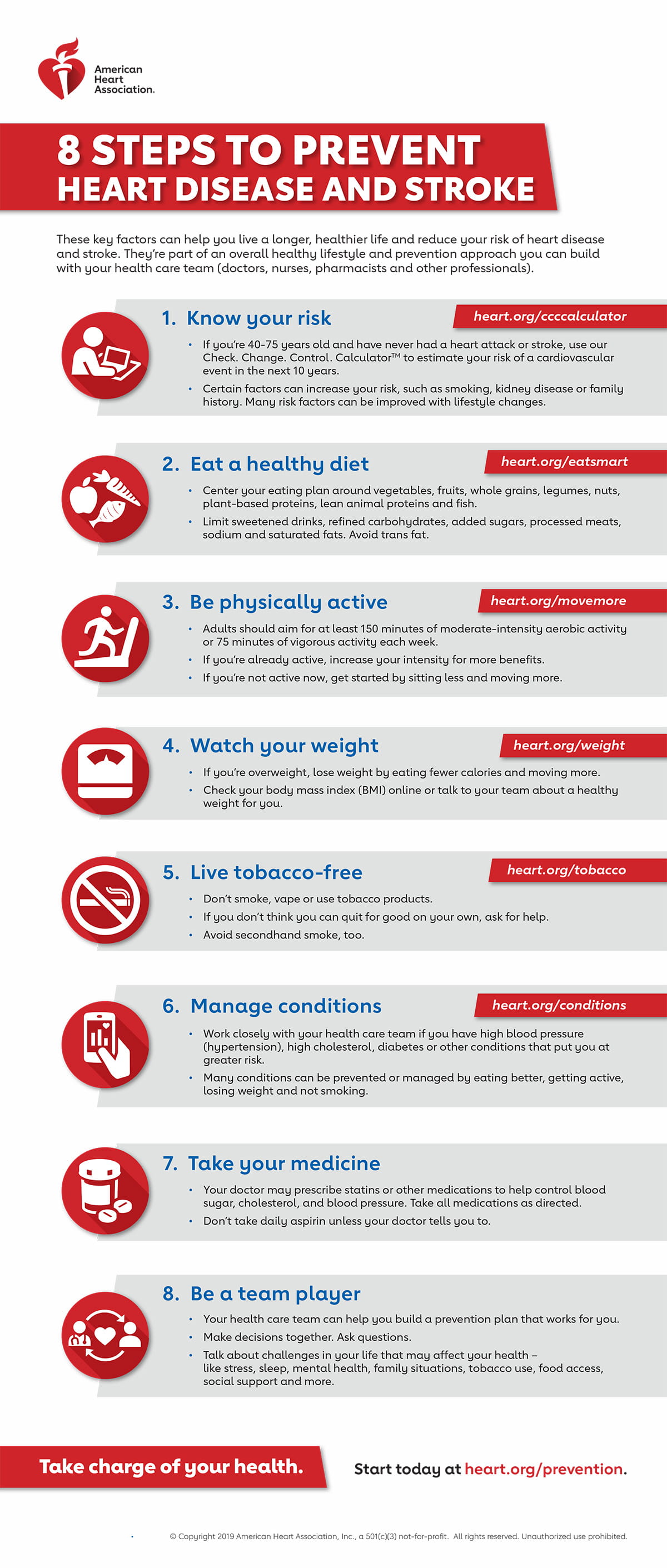8 Steps to Prevent Heart Disease and Stroke - Infographic

8 Steps to Prevent Heart Disease and Stroke
These key factors can help you live a longer, healthier life and reduce your risk of heart disease and stroke. They’re part of an overall healthy lifestyle and prevention approach you can build with your health care team (doctors, nurses, pharmacists and other professionals).
1. Know your risk. heart.org/ccccalculator
- If you’re 40-75 years old and have never had a heart attack or stroke, use our Check Change Control Calculator to estimate your risk of a cardiovascular event in the next 10 years.
- Certain factors can increase your risk, such as smoking, kidney disease or family history. Many risk factors can be improved with lifestyle changes.
2. Eat a healthy diet. heart.org/eatsmart
- Center your eating plan around vegetables, fruits, whole grains, legumes, nuts, plant-based proteins, lean animal proteins and fish.
- Limit sweetened drinks, refined carbohydrates, added sugars, processed meats, sodium and saturated fats. Avoid trans fat.
3. Be physically active. heart.org/movemore
- Adults should aim for at least 150 minutes of moderate-intensity aerobic activity or 75 minutes of vigorous activity each week.
- If you’re already active, increase your intensity for more benefits.
- If you’re not active now, get started by sitting less and moving more.
4. Watch your weight. heart.org/weight
- If you’re overweight, lose weight by eating fewer calories and moving more.
- Check your body mass index (BMI) online or talk to your team about a healthy weight for you.
5. Live tobacco-free. heart.org/tobacco
- Don’t smoke, vape or use tobacco products.
- If you don’t think you can quit for good on your own, ask for help.
- Avoid secondhand smoke, too.
6. Manage conditions. heart.org/conditions
- Work closely with your health care team if you have high blood pressure (hypertension), high cholesterol, diabetes or other conditions that put you at greater risk.
- Many conditions can be prevented or managed by eating better, getting active, losing weight and not smoking.
7. Take your medicine
- Your doctor may prescribe statins or other medications to help control cholesterol, blood sugar and blood pressure. Take all medications as directed.
- Don’t take daily aspirin unless your doctor tells you to.
8. Be a team player.
- Your health care team can help you build a prevention plan that works for you.
- Make decisions together. Ask questions.
- Talk about challenges in your life that may affect your health – like stress, sleep, mental health, family situations, tobacco use, food access, social support and more.
Take charge of your health. Start today at heart.org/prevention.
© Copyright 2019 American Heart Association, Inc., a 501(c)(3) not-for-profit. All rights reserved. Unauthorized use prohibited.